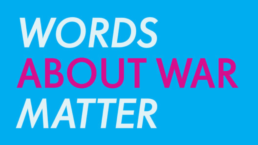The words we use to describe war and foreign policy matter, and they have far reaching implications for policymaking.
From George Orwell’s critique of the language of totalitarian regimes to today, discussions of war and foreign policy have been full of dehumanizing euphemisms, bloodless jargon, little-known government acronyms, and troubling metaphors that hide warfare’s damage.
Think of “collateral damage” (civilian deaths), “overseas contingency operations” (wars), and “bug splat” (killing human beings with drone-fired missiles).

This guide aims to help people write and talk about war and foreign policy more accurately, more honestly, and in ways people outside the elite Washington, DC foreign policy “blob” can understand.
We encourage you to use this guide, to share it with others, and to adapt it as necessary to local contexts. The guide should be especially helpful to journalists and other writers, podcasters and vloggers, policy analysts, teachers, scholars, and people involved in public education projects.
Recent Posts
‘Unconstitutional. Unethical. Authoritarian.’ ICE Bars Millions Of Immigrants From Bond Hearings
July 18, 2025
Take Action Now One watchdog said the new policy “seems like a blatant attempt to stop them from exercising their right to due process.”……
Americans Are Not Nearly Alarmed Enough About Climate Change
July 18, 2025
Take Action Now Americans still don’t comprehend how imminent, dangerous, and far-reaching the threat is—and journalists are partly to blame.By…
The IRS Is Building A Vast System To Share Millions Of Taxpayers’ Data With ICE
July 17, 2025
Take Action Now ProPublica has obtained the blueprint for the Trump administration’s unprecedented plan to turn over IRS records to Homeland Security…
Israel’s Sudden Assault On Syria Is Unchecked Aggression
July 17, 2025
Take Action Now Jerusalem is bombing Damascus and threatening al-Sharaa’s rule, while Washington was hoping to help the nascent government on…




